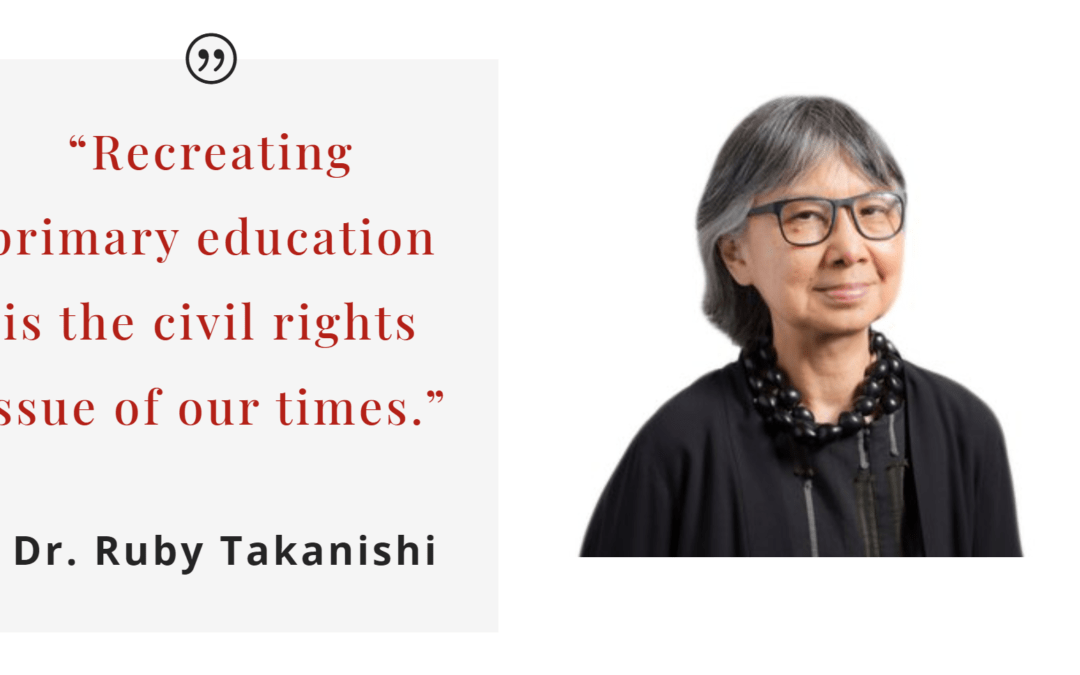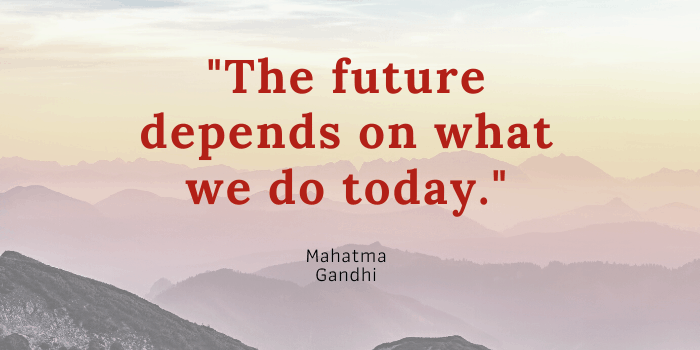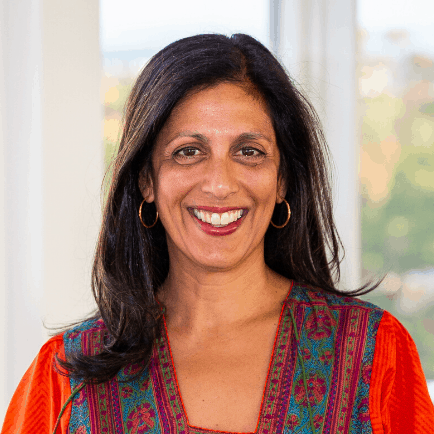
by Swati Adarkar | Aug 13, 2020 | News, Announcements
“Recreating primary education is the civil rights issue of our times.”
On Saturday evening we lost a giant in the field of education and child development. Dr. Ruby Takanishi was an amazing woman and thought leader who devoted her life to making a difference in the lives of children over many decades of unwavering commitment and passion to create equitable educational opportunity.
She was the longtime president of the Foundation for Child Development and made numerous contributions in that role including developing the PreK-3rd movement, and a fierce commitment to the needs of immigrant children and dual language learners. She was always ahead of public opinion.
Many of us at Children’s Institute are indebted to her guidance and support over the years. More than a decade ago, she helped shape the direction of Early Works and more recently served as senior advisor to the development and launch of Early School Success. She was our mentor, and pushed us to explore new information and ideas, read the latest research, ask probing and insightful questions, listen to more voices, and dig deep on the issues impacting young children and their families.
Dr. Takanishi’s generosity and impact has left us with the enormous responsibility of living up to her expectations of creating a society that truly supports all children and families, guided by research best practices and informed policy.
We have had the honor of many constructive and thoughtful conversations with Dr. Takanishi over the years, and we are fortunate to have two of them recorded for The Early Link Podcast.
In one segment, she discusses her book, First Things First: Creating the New American Primary School. In addition to sharing insights about reimagining public education, Dr. Takanishi discusses inequalities in education based on a variety of interconnected factors: varied state investments and strategies, declining federal investments in children and families, and the changing roles of parents, families, and communities in the public school system. She also provides advice for Oregon in building a stronger early learning system, and much more. Listen or read the transcript here.
In a discussion focused on English language learners, Dr. Takanishi joined two Oregon educators to discuss the needs of English learners and dual language learners in our schools, communities, and early learning systems. We learned about recommendations to promote the educational success of young English learners based on her experience as the chair for the Committee on Fostering School Success for English Learners and her role in developing its final report. We also explored the work in two Oregon districts leading the way on language development for their students. Listen or read the transcript here.
As we reflect on her significant contributions, we should remember her guiding advice at this time of unparalleled disruption across our schools and educational institutions:
“The schools we have today are a product of the last century. It is time to put our own generation to the test by designing a system that will help all of our youngest learners realize their educational potential. Talent is universally distributed. Opportunity to develop that talent, sadly, is not.”
Ruby has had a lasting imprint on the values and work of the Children’s Institute, and we are forever grateful.
We know you care about young children and their families in Oregon. Turn your caring into action. Your tax deductible contribution allows us to continue our outreach to communities across Oregon impacted by the COVID-19 pandemic. Your generous donation makes a difference!

by Swati Adarkar | May 31, 2020 | News, Policy Trends, Announcements, Equity
A statement from Swati Adarkar, President and CEO, and Rafael Otto, Director of Communications.
We are heartbroken by the recent loss of life in cities across America and our failure to uphold a society based on racial and economic justice.
The reasons for fury, disbelief, grief, and destruction across the country in recent days are many. Among them: the deaths of George Floyd, Ahmaud Arbery, and Breonna Taylor.
The excruciating video of a police officer slowly taking the life of George Floyd is another painful reminder of the experience that being Black in America is laced with fear and the threat of violence. During the COVID-19 crisis, it also exacerbates the pain and economic hardship experienced by the Black community. Historical trauma, institutionalized racism, and structural discrimination continue to hold America back from making real progress.
The evidence supports this. Our systems need reform, including law enforcement, health, and education. We can see that they do exactly what they are designed to do. They reinforce inequality, poor health outcomes, opportunity and achievement gaps, socioeconomic disparities, poverty, and structural bias.
It is time for our elected leaders and policymakers to act boldly and change the course of history. As Dr. Martin Luther King Jr. reminded us, silence is a form of betrayal.
In the work ahead, we must recognize that we still live in a divided America. Prosperity and opportunity are not available equitably. Disparities continue to grow. More children are living in poverty, and the basic rights of low-wage workers and families are largely being ignored.
As advocates, we will not stand by and watch in silence. We must do much more to lift up the needs of Black children and the thousands of other vulnerable children, families, and communities in the work we do, the policies we shape, and the vision we hold for a more equitable Oregon. We know that to level the playing field we must prioritize the needs of children of color, children experiencing poverty, English language learners, children with disabilities and developmental delays, children who are immigrants and refugees, children in geographically isolated communities, children in foster care, and children experiencing unstable housing.
At present, young children in Oregon are more racially and ethnically diverse than adults. We must work harder than ever to ensure that they grow up in a world that values their lives and creates the conditions for them to thrive.
We must build alliances and recommit to transforming our state and our society.
Your voice — our voices — are important. So are our actions and our votes.
We can and will make a difference, as individuals, as an organization, and as partners in the protracted struggle for justice, equality, and human rights.

by Swati Adarkar | May 22, 2020 | Child Care, News, Oregon Policy, Announcements, COVID-19
Oregon is facing the most severe health and economic crisis in our lifetime and the state’s revenue forecast released yesterday paints a grim picture. State budgets are facing a $2.7 billion hit to the current revenue cycle and another $7.8 billion loss through 2025.
We are deeply concerned for those hardest hit by the impacts of COVID-19: young children and families experiencing poverty, low-wage workers, women, children and communities of color, immigrants, and those managing disabilities.
The COVID-19 pandemic has exacerbated an existing crisis for vulnerable young children across the state at a time when wide opportunity gaps were already impacting access to quality early care and education and basic health services. The number of children living in low-income households is increasing. Early learning programs like child care and preschool have closed, and many may not reopen. Children are missing critical well-child checkups and immunizations creating further disparities and public health dangers.
Existing and entrenched racial and economic disparities in our health systems are compounding the impact of COVID-19 on communities of color. This includes increased food insecurity and housing instability during the most critical time for young children to develop a strong foundation.
Oregon cannot afford to go backwards. It is essential that we reach more children with the committed early learning funds from the Student Success Act.
Now is the time to hold firm on Oregon’s commitment to young children and their families and to protect and expand our early childhood investments.
Our elected leaders face serious challenges as they work to create an economic response to the COVID-19 pandemic that brings needed relief to individuals and communities across the state. We urge them to focus on reducing disparities and increasing opportunities for children before they arrive at kindergarten. We know that children who start school behind stay behind.
Early childhood investments are a smart choice. They can begin to break down structural inequalities in our communities and our society. They effectively strengthen a child’s ability to grow and learn during the most rapid period of brain development, from birth to age 5. And they yield a significant return on investment, benefiting children and society in the short and long term.
A recent review by RAND Corporation scientists of early childhood program evaluations showed that 90% of programs had a positive effect. Among programs with an economic evaluation, the typical return is $2 to $4 for every dollar invested.
Now is the time to hold firm on Oregon’s commitment to young children and their families and to protect and expand our early childhood investments. This will take moral courage and clarity about how to best address long-standing inequities in Oregon while considering the state’s future economic health.
We are inspired by Oregonians coming together to create solutions, and we know that centering our most vulnerable children and families when decisions are made will give us a stronger and healthier state. We stand ready to work with our elected officials, partners, and families to ensure a brighter, healthier future for us all.
Resources
View the Complete Revenue Forecast
View the Revenue Forecast Summary

by Swati Adarkar | Mar 28, 2020 | News, Oregon Policy, Announcements, COVID-19
“The future depends on what we do today.”
Dear CI Friends,
What we are experiencing with COVID-19 is unlike anything any of us have known in our lifetime. The ways in which our individual and societal health and well-being are interconnected is finally becoming more broadly understood. It’s unfortunate that it takes a crisis for us to gain this clarity. Right now, we are witnessing the adverse consequences of decades of disinvestment in our public health and government agencies at the federal, state, and local levels. Low-income communities have been experiencing the brunt of this disinvestment disproportionately for years and now the broader public is slowly waking up.
We must be clear eyed about the consequences of our past short-sighted decisions and shift how we act collectively, now and down the road, knowing that building and preparing takes decades and consistency. Children’s Institute has always focused on prevention, and we believe it’s important to respond to the crisis swiftly while not creating more downstream problems by neglecting current urgent health and community needs.
We are doing all we can to support our partners and stay connected during this crisis. We are providing access to current information regarding protocols and guidance for early care and education providers and ensuring child care gets elevated as an urgent investment priority. We are staying connected to school leaders to help them support early learning and family engagement. We are also working with our partners in the Early Childhood Coalition to stay connected to national conversations and communicate in one clear voice to state and federal officials about what families and providers need. As information and supports start flowing from Salem and Washington D.C., we will continue to monitor, distribute, and translate relevant information while finding ways to center families and reach communities with diverse linguistic needs.
We know that the challenges for parents, families, and communities are mounting and changing day by day. The economic reality for many currently is stark, and the rapidly increasing loss of life is heartbreaking. Parents are juggling work and family with kids home from child care and school. But we are seeing many bright spots and cause for hope. People are pulling together in new, collaborative, and creative ways. More online learning options are available for teachers and families. Telehealth options are increasingly becoming available so that young children and families can remain connected with their pediatricians and primary care providers.
Even though our team is all working remotely we are more unified than ever in our shared commitment to support Oregon’s young children and families. And we are eager to work with all of you to pay close attention to immediate needs and not take our eye off our future—our children.
We also have the deepest appreciation and gratitude for the front line workers who are daily risking their lives to keep us safe and healthy.
Sending you and yours wishes of good health as we all look on the horizon for better times ahead.
With appreciation,
Swati
We know you care about young children and their families in Oregon. Turn your caring into action. Your tax deductible contribution allows us to continue our outreach to communities across Oregon impacted by the COVID-19 pandemic. Your generous donation makes a difference!






